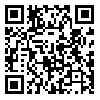BibTeX | RIS | EndNote | Medlars | ProCite | Reference Manager | RefWorks
Send citation to:
URL: http://ijer.hormozgan.ac.ir/article-1-374-en.html
2- Department of Psychology and Educational Sciences, University of Tehran, Tehran, Iran
3- Faculty of Health, Qom University of Medical Sciences, Qom, Iran
Objective: The present study was conducted to determine the effectiveness of paradoxical therapy on rumination in students preparing for the university entrance exam.
Methods: This research employed a quasi-experimental design with a pretest–posttest control group. The statistical population included all entrance-exam students residing in dormitories in Qom city during the 2023–2024 academic year. From this population, 30 students were selected through purposive random sampling and randomly assigned to an experimental group and a control group (15 students in each). Research instrument included the Ruminative Responses Scale (RRS; Nolen-Hoeksema & Morrow, 1991). The experimental group received paradoxical therapy in six sessions, each lasting up to 45 minutes and held biweekly, while the control group did not receive any intervention. Data were analyzed using SPSS version 25 with univariate analysis of covariance.
Results: Findings showed a significant difference between the mean scores of ruminations in the experimental group at the posttest stage compared to the pretest. Paradoxical therapy explained more than 16% of the variance in posttest rumination scores.
Conclusions: Paradoxical therapy improved rumination in students preparing for the university entrance exam.
Received: 2025/01/14 | Accepted: 2025/04/28 | Published: 2025/09/1
| Rights and permissions | |
 |
This work is licensed under the Creative Commons - Attribution 4.0 International. |






